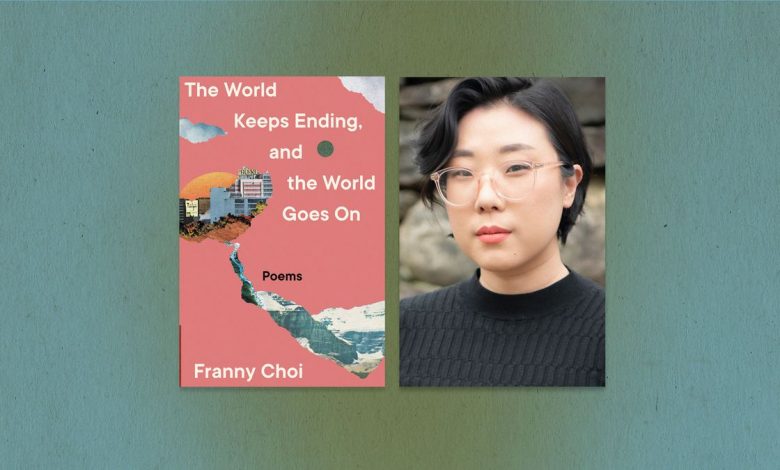The End has Always Been Here

Nicole Belcastro ‘24 / Emertainment Monthly Staff Writer
Franny Choi’s newest poetry collection The World Keeps Ending, and the World Goes On ends before it even has a chance to begin. According to Choi, the apocalypse has already happened, is happening now, and will happen. In the first poem, named after the title of the collection, Choi writes, “Before the apocalypse, there was the apocalypse of… .” The apocalypse is always happening, in small ways, in catastrophic ways, in personal ways, and in global ways. Each apocalypse breeds another.
Choi pens four consecutive poems titled “Upon Learning That Some Korean War Refugees Used Partially Detonated Napalm Canisters as Cooking Fuel”. In one of them she writes, “Dystopia is the word for what’s already happened so many times, it’s the reason ____’s so cheap.” If the dystopia and apocalypse has already happened and continues to happen, how are we always so ill prepared? In the same poem, she writes how everyone will think “how did we get here?” and “how did it get to this?” as if most of the apocalypses Choi describes do not happen gradually before our eyes.
This poetry collection is a companion for all living through our current, turbulent society. Readers will have many moments of realization that Choi is writing these poems for them. She opens the poem “Catastrophe Is Next To Godliness” with: “Lord, I confess I want the clarity of the catastrophe but not the catastrophe./ Like everyone else, I want a storm I can dance in./ I want an excuse to change my life.” Choi holds her readers close as she relates to feelings many connect with.
In other poems, Choi reaches through the page, grabs the reader, and rattles them, directing their attention to the urgency of the situation. Choi writes about grief with a crushing intensity. Her writing gives grief a never-ending pulse. She writes, “Grief’s a heavy plant, and green.” Choi’s grief weighs heavily on her as she spends part of her life grieving the actual loss of family members, a former boyfriend, and the world. The other part, she spends grieving the future loss of her mother. Choi’s belief that war never ends applies to grief. Grief is something we can never rid ourselves of. It weighs heavy and becomes a catastrophe of its own.
Yes, the world keeps ending. But, there are moments where our spirit can be inspired to weather the storm. In the shockingly hopeful poem “On How”, Choi explores how society collectively made efforts against the impending doom we all face. She writes, “& dreamed past doom/ & walked, fell, walked,/ fell, walked, fell, walked.” Having already expressed that she needs an excuse to change her life, Choi understands that catastrophe is perhaps the best excuse of all. And, since there is always catastrophe, the time is now.
As Choi sees it there are few moments of hope and celebration to cling onto during the apocalypse, but the only way out of the constant doom is death: “Someday we’ll lie in dirt./ With mouth and mushrooms, the earth will accept our apology.” Choi laments how useless we all are in the face of disaster, but she does not claim to have all the answers as she closes her book with: “Forgive me; I see it now. I wasted so much time being wrong.”